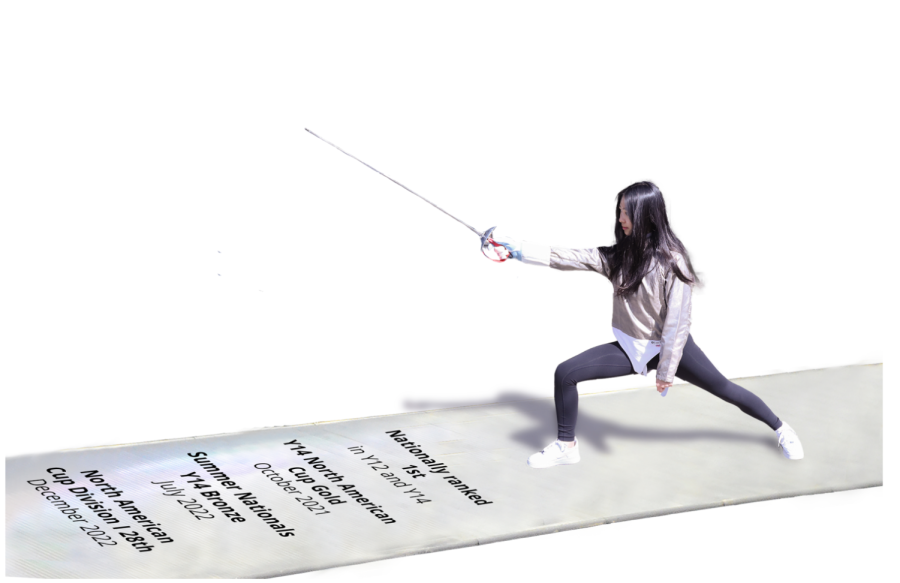Grace Ker’s journey to the international ranks
Photo by Susanna Tang Graphic illustrations by Daeun Chung and Calvin Zhou
Sophomore Grace Ker fences for the USA Cadet Fencing team.
March 10, 2023
In a sweaty stadium resounding with the screams of an excited audience, Team USA becomes the World Cup Cadets champion as the final member of the team wins against her opponent. Sophomore Grace Ker and her teammates rush to the fencing strip, embracing the winner with pride.
Ker was first introduced to fencing when she was nine years old. A family friend had recommended her to try out the sport since it involved a lot of strategy and wasn’t as physically demanding. Since joining the USA Cadet Fencing team and competing in sabre, Ker’s schedule has been packed with regular travel to compete against international opponents.
“I was able to travel to many European countries this year during the World Cups,” Ker said. “It was really nice getting to explore the countries while connecting with my team.”
In 2023, Ker competed in two national and two international competitions. Her most memorable moment was winning the world championships at the World Cup in Romania. This win was significant to her because it helped her learn the value of building strong relationships among a team. The close-knit relationships between everyone on their team helped them support each other and reduce stress during the competition, ultimately carrying them to win.
“We were cheering much louder than all the other teams,” Ker said. “I feel like our team dynamic carried us to win, which was really fun and rewarding.”
On average, Ker has two to three hours of training for four days a week. She trains at Cardinal Fencing Club in the Stanford University facility, where they sometimes train with the Stanford fencing team.
Ker initially started learning fencing with foil, the lightest and most commonly seen fencing blade, but she eventually switched to sabre. Unlike the other two fencing blades, which involve timing aspects, sabre is faster so it does not require a timer. Ker enjoys this because she doesn’t have to worry about the time while competing and can play to her strengths by focusing on her speed and agility.
Success in sabre relies heavily on strategy — Ker likes that athletes are constantly refining their approaches and adapting their mindset to compete against different opponents they face.
“I like that everyone has their own unique way of playing,” Ker said. “It really makes competing more interesting and fun.”
Before joining the USA fencing team, Ker mainly relied on increasing her speed and focusing on quick movements to win a match. This tactic worked in her early years of fencing because her opponents at that age were not fully developed in their skill. As Ker faced older and more advanced opponents, they were able to discern her strategy and figure out how to counteract it.
“I had to learn how to change my strategy,” Ker said. “This was one of my greatest struggles because I had to learn to change and adapt, while still being myself and doing what I’m good at.”
Another one of Ker’s challenges has been to overcome her fear of falling down ranks. Fencing rankings fluctuate much more often than that of other sports, so it is important for fencers to stay humble even after a big win.
“After achieving a lot of good results, it’s really easy to get beaten by others because of the pressure from high expectations,” Ker said. “Staying focused in the game and not on my rank helps a lot.”
Something that helps Ker stay focused in a game is to perform various five-second warmups, such as doing jumps before a match or bending her blade after every point. This acts as a mental reset for her, helping her acknowledge that the point is over and to get ready for the next.
In the upcoming year, Ker plans to continue attending fencing competitions and is working on her technique. She will also be actively involved in the college recruitment process and hopes to commit before February of next year.


































































